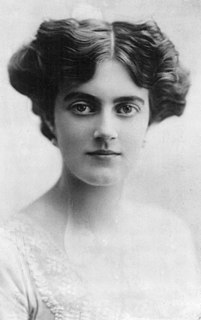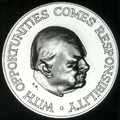Related Research Articles

Sir Winston Leonard Spencer Churchill, was a British statesman, army officer, and writer. He was Prime Minister of the United Kingdom from 1940 to 1945 during the Second World War, and again from 1951 to 1955. Apart from two years between 1922 and 1924, Churchill was Member of Parliament (MP) from 1900 to 1964 and represented a total of five constituencies. Ideologically an economic liberal and imperialist, he was for most of his career a member of the Conservative Party, as leader from 1940 to 1955. He was a member of the Liberal Party from 1904 to 1924.
Wilfrid was an English bishop and saint. Born a Northumbrian noble, he entered religious life as a teenager and studied at Lindisfarne, at Canterbury, in Gaul, and at Rome; he returned to Northumbria in about 660, and became the abbot of a newly founded monastery at Ripon. In 664 Wilfrid acted as spokesman for the Roman position at the Synod of Whitby, and became famous for his speech advocating that the Roman method for calculating the date of Easter should be adopted. His success prompted the king's son, Alhfrith, to appoint him Bishop of Northumbria. Wilfrid chose to be consecrated in Gaul because of the lack of what he considered to be validly consecrated bishops in England at that time. During Wilfrid's absence Alhfrith seems to have led an unsuccessful revolt against his father, Oswiu, leaving a question mark over Wilfrid's appointment as bishop. Before Wilfrid's return Oswiu had appointed Ceadda in his place, resulting in Wilfrid's retirement to Ripon for a few years following his arrival back in Northumbria.
Henry Watson Fowler was an English schoolmaster, lexicographer and commentator on the usage of the English language. He is notable for both A Dictionary of Modern English Usage and his work on the Concise Oxford Dictionary, and was described by The Times as "a lexicographical genius".

Jennie Spencer-Churchill, known as Lady Randolph Churchill, was an American-born British socialite, the wife of Lord Randolph Churchill, and the mother of British prime minister Sir Winston Churchill.

Lord Randolph Henry Spencer-Churchill was a British statesman. Churchill was a Tory radical and coined the term 'Tory democracy'. He inspired a generation of party managers, created the National Union of the Conservative Party, and broke new ground in modern budgetary presentations, attracting admiration and criticism from across the political spectrum. His most acerbic critics were in his own party, among his closest friends; but his disloyalty to Lord Salisbury was the beginning of the end of what should have been a glittering career. His elder son, Winston, wrote a biography of him in 1906.

Wansdyke is a series of early medieval defensive linear earthworks in the West Country of England, consisting of a ditch and a running embankment from the ditch spoil, with the ditching facing north.
Honorius was a member of the Gregorian mission to Christianize the Anglo-Saxons from their native Anglo-Saxon paganism in 597 AD who later became Archbishop of Canterbury. During his archiepiscopate, he consecrated the first native English bishop of Rochester as well as helping the missionary efforts of Felix among the East Anglians. Honorius was the last to die among the Gregorian missionaries.

The House of Wessex, also known as the House of Cerdic, refers to the family that initially ruled a kingdom in southwest England known as Wessex, from the 6th century under Cerdic of Wessex until the unification of the Kingdoms of England by Alfred the Great and his successors. Alfred and his successors would also be part of this dynasty, which would continue ruling in the main line all the way until Alfred's descendant, Ethelred the Unready, whose reign in the late 10th century and early 11th century saw a brief period of Danish occupation and following his and his son Edmund Ironside's death, kingship by the Danish Cnut the Great and his successors to 1042. The House of Wessex then briefly regained its power for 24 years, but after the deposition of its last scion, Ethelred's great-grandson Edgar Ætheling, it faded into the annals of history. Edgar himself died after a long and adventurous life sometime after 1125. All kings of England and Great Britain since Henry II have nevertheless been descended from the House of Wessex through Henry I's wife Matilda of Scotland—a daughter of Edgar Ætheling's sister, Margaret of Wessex.

Clementine Ogilvy Spencer Churchill, Baroness Spencer Churchill, was the wife of Winston Churchill, Prime Minister of the United Kingdom, and a life peer in her own right. While legally the daughter of Sir Henry Hozier, her mother’s known infidelity and his suspected infertility make her paternal parentage uncertain. She met Winston Churchill in 1904 and they began their marriage of 56 years in 1908. They had five children together, one of whom died at the age of two from sepsis. During World War I, Clementine organised canteens for munitions workers and during World War II, she acted as Chairperson of the Red Cross Aid to Russia Fund, President of the Young Women’s Christian Association War Time Appeal and Chairman of Maternity Hospital for the Wives of Officers, Fulmer Chase. Throughout her life she was granted many titles, the final being a life peerage following the death of her husband in 1965. In her later years, she sold several of her husband’s portraits to help support herself financially. She died in her London home at the age of 92.
The Anglo-Portuguese Treaty of 1373 was signed on 16 June 1373 between King Edward III of England and King Ferdinand and Queen Eleanor of Portugal. It established a treaty of "perpetual friendships, unions [and] alliances" between the two seafaring nations.
Sir David Mackenzie Wilson is a British archaeologist, art historian, and museum curator, specialising in Anglo-Saxon art and the Viking Age. From 1977 until 1992 he served as the Director of the British Museum, where he had previously worked, from 1955 to 1964, as an assistant keeper. In his role as director he was implicated in the international controversy concerning looting related to the British Museum, indirectly playing a major role in the growing movement for the restitution of the Parthenon Marbles to Athens.

Jackboots on Whitehall is a 2010 British puppet adult animated satirical action comedy film set in an alternative history Second World War, in which Nazi Germany has seized London. The British must band together at Hadrian's Wall if they are to thwart the German invasion. Conceived by Edward and Rory McHenry, it is the first of its kind to feature animatronic puppets and the voices of well-known British actors including Ewan McGregor, Rosamund Pike, Richard E. Grant, Timothy Spall, Richard O'Brien and Richard Griffiths. The film was executive produced by Frank Mannion.

Winston Churchill Memorial Trusts (WCMT) are three independent but related living memorials to Sir Winston Churchill, based in the United Kingdom, Australia, and New Zealand. They exist for the purpose of administering Churchill Fellowships, also known as Churchill Travelling Fellowships, to provide an opportunity for applicants to travel overseas to conduct research in their chosen fields.

No. 615 Squadron was a unit of the British Auxiliary Air Force and later the Royal Auxiliary Air Force between 1937 and 1957.
The Battle of Mercredesburne was one of three battles fought as part of the conquest of what became the Kingdom of Sussex in southern England. The battles were fought between the Saxon leader Ælle's army and the local Britons.
The Husmerae were a tribe or clan in Anglo-Saxon England, possibly forming an early settlement of the Hwicce subkingdom. Charter evidence also referred to the group as Wiogorna and was also considered a prouvincia or provincia, an administrative division with its own territorial boundaries. An account also refer to the Husmerae territory as a regio.

The Essex flag is the flag of the English county of Essex. The flag of Essex is ancient in origin and features three notched Saxon seaxes (cutlasses) on a red field.
Stephen Pollington is an English author who specialises in Anglo-Saxon England and the Old English language who has written a number of books on the subject, most of which have been published by the company Anglo-Saxon Books.

Darkest Hour is a 2017 war drama film directed by Joe Wright and written by Anthony McCarten. Set in May 1940, it stars Gary Oldman as Winston Churchill and is an account of his early days as prime minister during the Second World War and the May 1940 War Cabinet Crisis, while Nazi Germany's Wehrmacht swept across Western Europe and threatened to defeat the United Kingdom. The German advance leads to friction at the highest levels of government between those who would make a peace treaty with Adolf Hitler, and Churchill, who refused. The film also stars Kristin Scott Thomas, Lily James, Ben Mendelsohn, Stephen Dillane, and Ronald Pickup.

Sir Winston Churchill died on 24 January 1965, aged 90. His was the first state funeral for a non-royal family member since Lord Carson in 1935, and as of 2020 it remains the most recent state funeral in the United Kingdom. The official funeral lasted for four days. Planning for the funeral, known as Operation Hope Not, began 12 years before Churchill's death. It was initiated after Churchill's stroke in 1953 while in his second term as the Prime Minister of the United Kingdom. After several revisions due to Churchill's continued survival, the plan was issued on 26 January 1965, two days after his death.
References
- ↑ International League of Antiquarian Booksellers. "The Anglo-Saxon Review". Archived from the original on 7 October 2007. Retrieved 30 July 2020.
- ↑ Wertheim, Stanley (1997). A Stephen Crane Encyclopedia. Greenwood Publishing Group. ISBN 0313296928.
- ↑ McMorris, Jenny (2001). The Warden of English: The Life of H.W. Fowler. Oxford University Press. ISBN 0198662548.